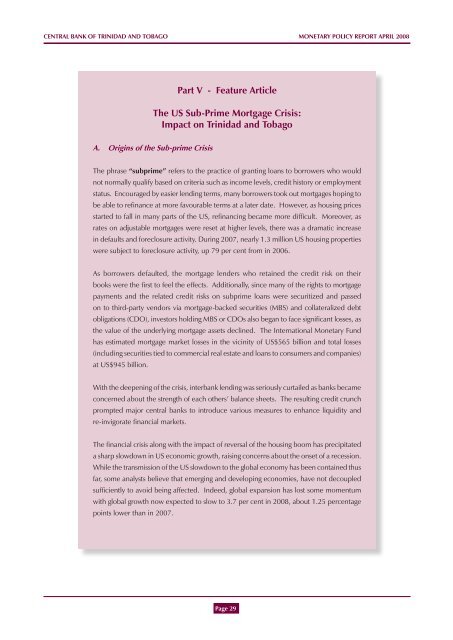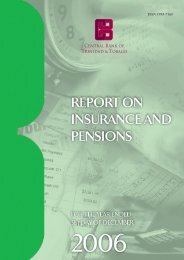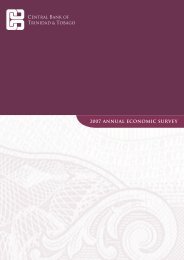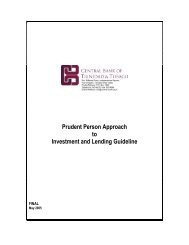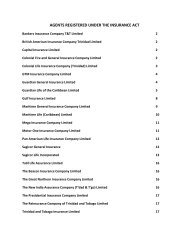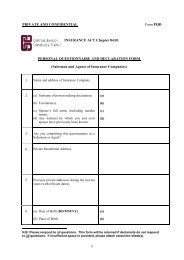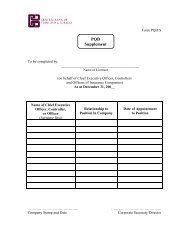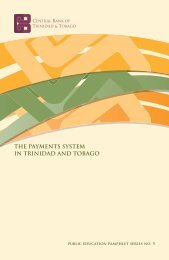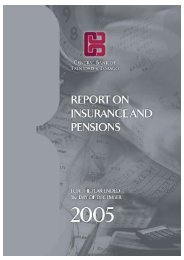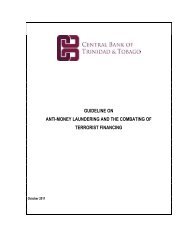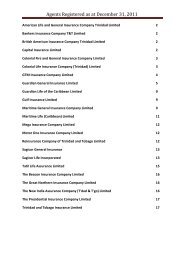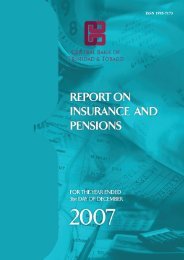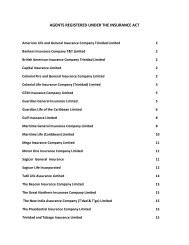April 2008 Report - Central Bank of Trinidad and Tobago
April 2008 Report - Central Bank of Trinidad and Tobago
April 2008 Report - Central Bank of Trinidad and Tobago
Create successful ePaper yourself
Turn your PDF publications into a flip-book with our unique Google optimized e-Paper software.
CENTRAL BANK OF TRINIDAD AND TOBAGO MONETARY POLICY REPORT APRIL <strong>2008</strong><br />
Part V - Feature Article<br />
The US Sub-Prime Mortgage Crisis:<br />
Impact on <strong>Trinidad</strong> <strong>and</strong> <strong>Tobago</strong><br />
A. Origins <strong>of</strong> the Sub-prime Crisis<br />
The phrase “subprime” refers to the practice <strong>of</strong> granting loans to borrowers who would<br />
not normally qualify based on criteria such as income levels, credit history or employment<br />
status. Encouraged by easier lending terms, many borrowers took out mortgages hoping to<br />
be able to refinance at more favourable terms at a later date. However, as housing prices<br />
started to fall in many parts <strong>of</strong> the US, refinancing became more difficult. Moreover, as<br />
rates on adjustable mortgages were reset at higher levels, there was a dramatic increase<br />
in defaults <strong>and</strong> foreclosure activity. During 2007, nearly 1.3 million US housing properties<br />
were subject to foreclosure activity, up 79 per cent from in 2006.<br />
As borrowers defaulted, the mortgage lenders who retained the credit risk on their<br />
books were the first to feel the effects. Additionally, since many <strong>of</strong> the rights to mortgage<br />
payments <strong>and</strong> the related credit risks on subprime loans were securitized <strong>and</strong> passed<br />
on to third-party vendors via mortgage-backed securities (MBS) <strong>and</strong> collateralized debt<br />
obligations (CDO), investors holding MBS or CDOs also began to face significant losses, as<br />
the value <strong>of</strong> the underlying mortgage assets declined. The International Monetary Fund<br />
has estimated mortgage market losses in the vicinity <strong>of</strong> US$565 billion <strong>and</strong> total losses<br />
(including securities tied to commercial real estate <strong>and</strong> loans to consumers <strong>and</strong> companies)<br />
at US$945 billion.<br />
With the deepening <strong>of</strong> the crisis, interbank lending was seriously curtailed as banks became<br />
concerned about the strength <strong>of</strong> each others’ balance sheets. The resulting credit crunch<br />
prompted major central banks to introduce various measures to enhance liquidity <strong>and</strong><br />
re-invigorate financial markets.<br />
The financial crisis along with the impact <strong>of</strong> reversal <strong>of</strong> the housing boom has precipitated<br />
a sharp slowdown in US economic growth, raising concerns about the onset <strong>of</strong> a recession.<br />
While the transmission <strong>of</strong> the US slowdown to the global economy has been contained thus<br />
far, some analysts believe that emerging <strong>and</strong> developing economies, have not decoupled<br />
sufficiently to avoid being affected. Indeed, global expansion has lost some momentum<br />
with global growth now expected to slow to 3.7 per cent in <strong>2008</strong>, about 1.25 percentage<br />
points lower than in 2007.<br />
Page 29


